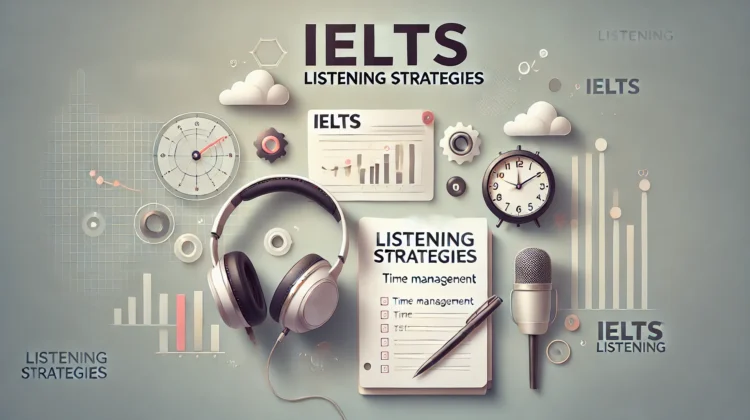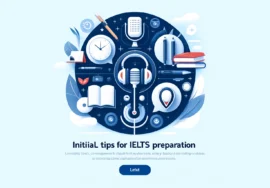
Strategies for the IELTS Listening Section
Learn effective strategies to excel in the IELTS Listening section, including tips on understanding question types, staying focused, improving listening skills, identifying keywords, and avoiding common mistakes. Enhance your preparation with time management techniques and advice on handling different English accents.
Strategies for the IELTS Listening Section
The IELTS Listening section is often considered one of the most challenging parts of the exam. However, with the right preparation and strategies, it is possible to excel in this section. In this guide, we’ll explore effective strategies that can help you approach the Listening test with confidence. These strategies include understanding the various types of questions, maintaining focus during the test, practicing effective exercises to improve listening skills, identifying key words in the audio passages, and avoiding common mistakes. Additionally, we will discuss the importance of time management, the role of listening for different accents, and how to handle unexpected challenges during the test.
• Types of Questions and How to Approach Them

The IELTS Listening section is made up of a variety of question types. It is essential to familiarize yourself with these different question formats to ensure that you know how to approach each one correctly. The main question types include:
-
Multiple-choice Questions
These questions often require you to listen for specific details, such as facts or opinions. They are designed to test your ability to differentiate between similar-sounding information. To excel in these questions, pay attention to keywords in the audio that indicate important distinctions. -
Sentence Completion
Sentence completion questions require you to fill in missing words or phrases based on what you hear. This type of question is about understanding the overall context of the audio and identifying words that logically complete the sentence. Practice with a variety of listening materials to improve your ability to predict words that fit the context. -
Matching Questions
These questions test your ability to match pieces of information with the correct options. You may be asked to match speakers to statements or events to locations. Listening carefully for names, locations, dates, and other identifying information will help you answer these types of questions correctly. -
Map or Diagram Labeling
In these questions, you may be asked to listen to a description of a place or process and label a map or diagram based on that description. It’s important to visualize the description as you listen to ensure you place the labels correctly.
• How to Stay Focused During the Test

Staying focused during the IELTS Listening test is essential for success, as the test lasts for about 30 minutes and requires sustained concentration. Here are some tips to help you stay focused:
-
Pre-Test Preparation
Before the test begins, take a few moments to read the instructions and questions carefully. This will help you understand the type of information you need to listen for. Being prepared in advance will help you stay focused when the audio begins. -
Active Listening
Active listening involves fully engaging with the audio, paying attention to every word, and mentally processing the information as it’s presented. This helps you catch important details that might be missed if you’re not paying full attention. -
Mindful Breathing and Relaxation
If you feel anxious or distracted, take a few deep breaths to calm your mind. Staying relaxed will help you stay focused and maintain a clear mind throughout the test.
• Effective Exercises to Improve Listening Skills

Improving your listening skills takes time and consistent practice. Here are some exercises that can help you enhance your listening abilities:
-
Listen to Authentic English Content
Listening to real-world English content, such as podcasts, news broadcasts, TV shows, and movies, is an excellent way to improve your listening comprehension. The variety of accents, speech patterns, and vocabulary will better prepare you for the test. -
Use IELTS-Specific Practice Materials
Utilize IELTS practice tests and listening exercises available in books or online platforms. These materials are designed specifically for the exam and will help you familiarize yourself with the question types and test format. -
Dictation Exercises
Try listening to short passages and writing down exactly what you hear. This will improve both your listening accuracy and your ability to catch every word. You can find dictation exercises online or in IELTS preparation books. -
Shadowing
Shadowing involves listening to an audio recording and immediately repeating what you hear. This technique helps improve both listening and speaking skills and boosts your ability to recognize words and phrases quickly.
• How to Identify Keywords in Audio Passages
Identifying keywords is crucial in the Listening section because these words often contain the essential information needed to answer the questions. Here’s how to improve your ability to identify keywords:
-
Pay Attention to Repeated Information
When a word or phrase is repeated multiple times in the audio, it is usually a signal that it is important. Listen carefully to how the speaker emphasizes these words, as they may be directly related to the question. -
Listen for Numbers, Dates, and Names
Numbers (e.g., phone numbers, prices), dates (e.g., historical dates, schedules), and names (e.g., people, places) are often critical pieces of information. Be sure to focus on these as they frequently appear in the answers. -
Understand the Context
It’s not just about hearing individual words; you must also understand the context in which they are used. This will help you identify the correct keywords that are relevant to the specific question.
• Avoiding Common Mistakes in Listening

Many test-takers make common mistakes during the IELTS Listening test, which can negatively affect their scores. Here are some tips to avoid these pitfalls:
-
Overlooking the Instructions
One common mistake is not paying attention to the instructions regarding word limits. If the instructions ask you to write no more than two words for each answer, make sure to follow this rule to avoid penalties. -
Getting Distracted by Unfamiliar Vocabulary
It’s easy to get caught up on words you don’t understand during the test, but this can lead to missed information. Instead of focusing on the unfamiliar word, try to grasp the overall meaning of the sentence or passage. -
Losing Track of the Audio
Another mistake is losing track of the audio and missing key information. If this happens, try to refocus immediately by reviewing the next question, so you don’t miss any further details. -
Not Reviewing Your Answers
Once the listening test is complete, you are given a short period to transfer your answers to the answer sheet. Use this time to double-check your responses and ensure they make sense with the context of the audio.
• Time Management in the Listening Test

Effective time management is essential in the Listening section. Although you have time to review each set of questions before the audio begins, the total time is limited. Practice managing your time efficiently by:
-
Listening and Reading Simultaneously
While listening to the audio, you can also read the next set of questions. This will help you anticipate the type of information to listen for, allowing you to answer faster. -
Avoiding Spending Too Much Time on One Question
If you are unsure about an answer, don’t spend too much time on it. Move on to the next question, and make sure to come back to any difficult ones later during the review time.
• Preparing for Different Accents in Listening
The IELTS Listening test features a variety of accents, including British, American, Australian, and Canadian. Being prepared to understand different accents is crucial for success. To practice:
-
Expose Yourself to Different Accents
Listen to materials from various English-speaking countries, such as podcasts, radio stations, and YouTube videos. The more diverse your listening practice, the better prepared you’ll be. -
Familiarize Yourself with Pronunciation Variations
Understand that different accents may pronounce words differently. For example, the word “schedule” is pronounced differently in British and American English. Becoming familiar with these variations will help you avoid confusion during the test.
Conclusion:
Mastering the IELTS Listening section requires more than just understanding the material—it demands focused preparation, practice, and strategic approaches. By familiarizing yourself with the different question types, staying focused during the test, and honing your listening skills through diverse exercises, you’ll be better equipped to handle the challenges of the exam. Additionally, identifying keywords, avoiding common mistakes, and managing your time effectively can help you achieve a higher score. With consistent practice and the right techniques, you can boost your confidence and improve your performance in the IELTS Listening section, ensuring success on test day.








